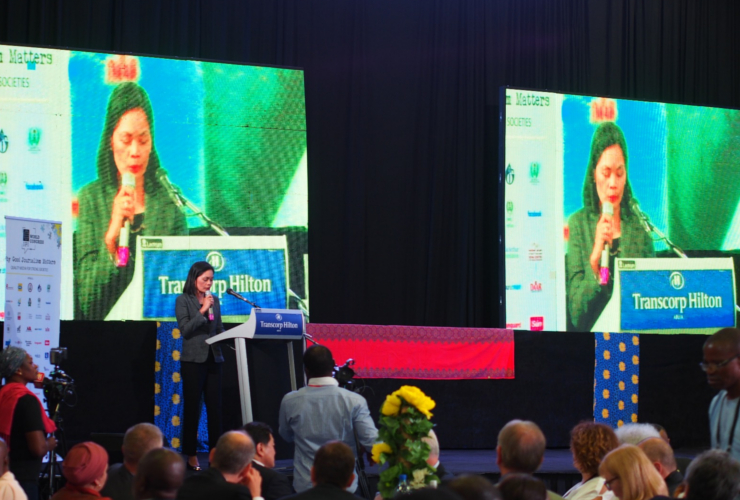The International Press Institute (IPI) today honoured Angolan anti-corruption journalist Rafael Marques and trailblazing Philippine news website Rappler at a special ceremony at the 2018 IPI World Congress in Abuja, Nigeria.
Marques, who has braved decades of harassment and prosecution to expose corruption and human rights abuses in Angola, was named last month as IPI’s 70th World Press Freedom Hero. He was prevented from travelling to Nigeria due to an ongoing court case in which he stands accused of insulting Angola’s former attorney general in an article scrutinizing murky real-estate transactions.
Speaking via recorded video to an audience of 250 leading editors and journalists from around the world, Marques called the award a “gift of hope that many Angolans are celebrating as their own triumph over the entrenched power of (the country’s) bandits”.
“Looting of the state, human rights abuses and political contempt for the suffering of the people are the main ills of Angolan society, where the powerful take away what rightfully belongs to everyone and trample on others’ lives”, he remarked.
He added: “This award is not for me. It mirrors the hopes of many Angolans that changes will not come simply from political decision-making, but from a growing awareness amongst and stand from civil society.”
The ongoing court case against Marques has dashed hopes that Angola, whose vast oil and mineral reserves have enriched a small ruling elite even as millions remain in poverty, would quickly undergo democratic reforms after the 38-year rule of former dictator José Eduardo dos Santos ended last year. A verdict in the trial, which could see Marques sentenced to up to four years in prison, is expected on July 6.
Rappler, a Philippine news website founded in January 2012, was previously announced as the recipient of the 2018 Free Media Pioneer award in recognition of its innovative approach to journalism and audience engagement as well as its determination to hold authorities accountable despite aggressive attacks on its operations.
Initially distinguishing itself by embracing crowdsourcing, citizen journalism and social media, Rappler has since grown into one of the Philippines’s most popular and effective investigative journalism outlets, providing critical coverage of the administration of President Rodrigo Duterte, who has presided over a deadly war on drug users and attacked the rule of law.
Rappler Managing Editor and Co-Founder Glenda Gloria accepted the award in person following an introduction by IPI Executive Board member Kaius Niemi.
“This award is not just for Rappler”, Gloria said. “This is for everyone all over the world who has continued to do good journalism despite being harassed, jailed and having their work hijacked by algorithms.”
In her acceptance speech, Gloria condemned the Duterte administration’s attempts to create a “climate of fear” and affirmed Rappler’s commitment to the innovative, social-media-driven approach to independent journalism that has guided the site since its founding.
“Six years later, social media has been weaponized against us by Duterte’s troll armies”, she conceded. “Yet Rappler’s growth would not have been possible outside this environment. It has given us spaces to connect better with audiences and it has made us better storytellers.”
The IPI World Press Freedom Hero award honours journalists who have made significant contributions to the promotion of press freedom, particularly in the face of great personal risk.
The annual Free Media Pioneer award was established by IPI in 1996 to recognize news or media organizations that have made innovations that have promoted news access or quality, or benefitted journalists and the media community, thereby ensuring freer and more independent media in their country or region.
For the past four years, both awards has been given in partnership with Copenhagen-based International Media Support (IMS).
